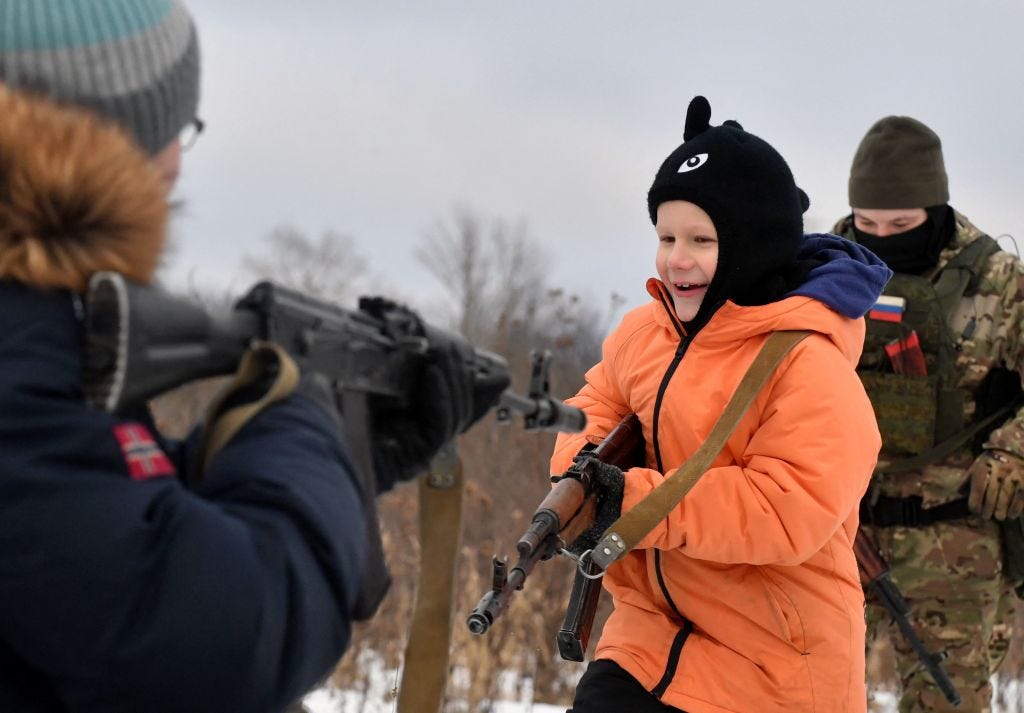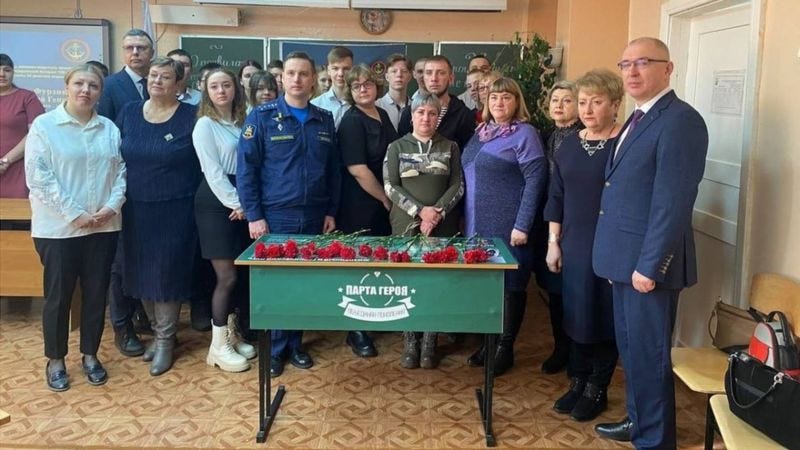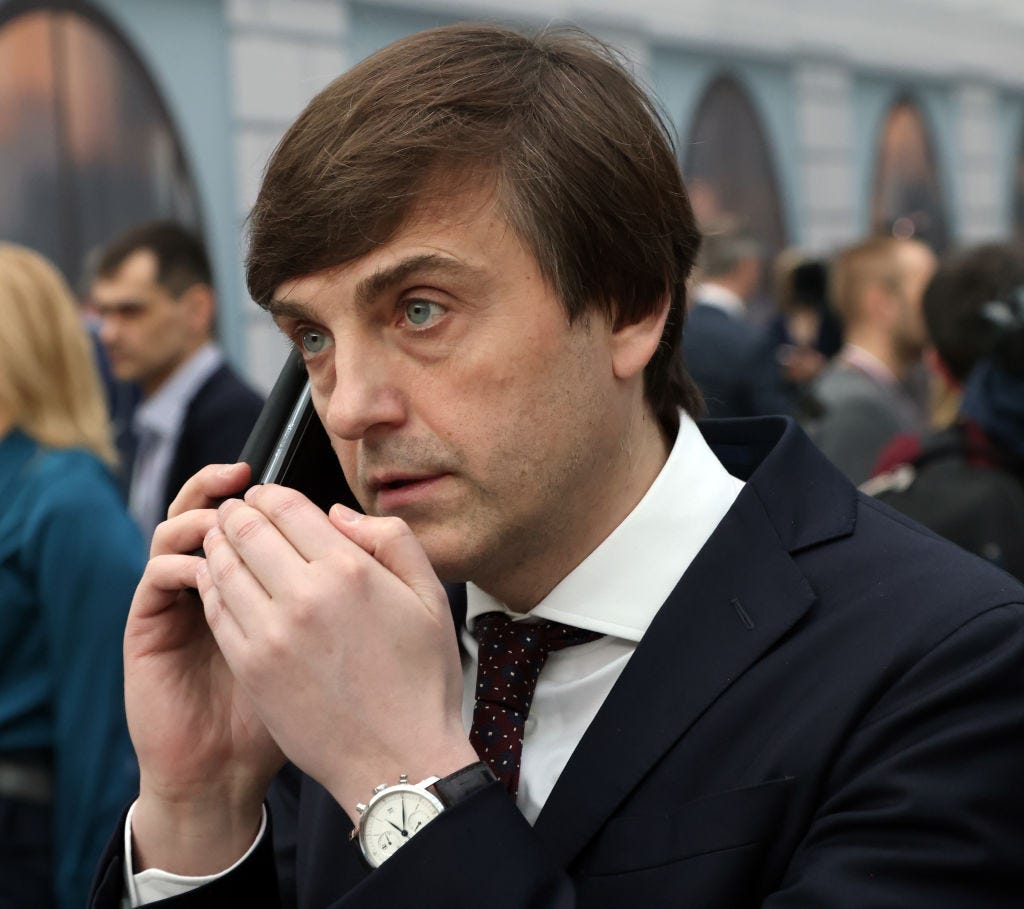Denunciations and dead heroes: How Russia's schools became a new frontline in the Ukraine war
BBC Russian reports on the dramatic and difficult changes that have been happening in Russia’s schools since the invasion of Ukraine.
By Nataliya Zotova.

As the war in Ukraine grinds on, Russia’s schools are coming under increasing pressure to promote patriotism in the classroom. The result has seen changes to the curriculum, ideology classes, and even plaques and ‘special’ desks in classrooms to commemorate dead soldiers. Teachers questioning the ‘special military operation’ fear denunciations from colleagues, and students. BBC Russian reports on a year of the dramatic and difficult change for the education system.
“There were so many abandoned houses. When we stopped, the first thing we did was set up a bathhouse to wash. We had no problems finding food. People had gone, they left it all behind. There was plenty of everything.”
This is how a soldier just back from Ukraine described his experiences on the front-line to a class of Stavropol school children recently. In a twist to the established practice of inviting WW2 veterans to come and give talks, the Stavropol school kids were hearing first hand how Russian soldiers are occupying civilian homes, stealing food and essentially looting the contents, in their country’s new war on Ukraine.
Soldiers in schools: the living and the dead
This is far from the only school to invite Russian soldiers from the “special operation” to tell the children stories about their “heroism.” Sometimes these visits are even covered by the local media. “The fighter regaled students with tales of soldiers’ heroism, and the mutual reward of military brotherhood,” ran a headline about one such visit to a school in Tambov.
At first glance, this might look like an extension of the tradition where veterans address children on the eve of Soviet Victory Day, every year on 9 March. These days it is not just veterans who speak – as few of them are still living – but also children born in wartime, as well as civilian survivors from the Siege of Leningrad who despite their advancing years still appear in schools. But as tenth-grader Sofia, [name changed] told the BBC, many guest speakers have stopped talking about World War Two.
“He [the survivor] gave us his views on what’s happening now in Ukraine. He said there are Nazis there, and they’d blown up the Crimean bridge. I didn’t really want to listen to him. It seems like Russia’s always struggling with some kind of evil, whether it’s people with non-traditional orientation, or the Nazis.”
“I just didn’t get it – he wasn’t a politician or an economist, he was this 90 year old guy. We were all so ashamed, we just stayed quiet,” says Sofia, angrily.

Schoolchildren who miss out on meeting the real invaders of Ukraine can still write to them. Over the winter a cross-country initiative was rolled out in schools, called “A Letter to a Soldier.”
In St Petersburg, English language teacher Larisa was asked by her bosses to get her students to participate in the project. She refused.
“I write letters to [jailed opposition politician] Vladimir Kara-Murza, to Lilia Chanysheva and Navalny. I have people to write to – I’m not going to write a letter to a soldier or fill children’s heads with diarrhoea,” she explains.
Larisa told the BBC that the school administration did eventually accept her objection, and stopped pressuring her, but her relationship with senior staff is now very strained.
Not everyone is willing to take stand. Many teachers are now quoting the national slogan: “all for the front, all for victory”, and there have been reports of children being encouraged to weave camouflage nets and make candles for the trenches.
In a theatrical and macabre piece of educational policy dead soldiers are also being allowed into schools.
“Heroes’ desks” have been set up in a number of schools, commemorating former students, who joined the army, and died in Ukraine.
In one classroom in Kemerovo, a desk was decorated with a big letter “Z” and a portrait of 21-year old Andrei Voronov. He left school in 2018, dreamed of becoming a doctor and graduated as a veterinary paramedic, In 2021 he was conscripted into the army and then like many, he signed a contract to become a regular solder and was killed in Ukraine.

The story of 21-year old Kirill Saikin from Krasnodar is similar: he was called up in 2021, signed a contract after three months, and was killed in Ukraine in summer 2022. A sticker on a “heroes’ desk” is now all that remains of him.
One school in Chita already has two “heroes’ desks,” one former student was killed in Ukraine at 21, and the second at 28.
Sometimes whole schools are even renamed – BBC Russian has reported on a school in Vladivostok which changed its name in honour of Evgeny Orlov, who was killed in the “special operation.” Orlov was a mercenary with the Wagner group who had also fought in the Donbas and Syria.
Sofia’s high school has no “heroes’ desks.” But they have been popping up at her old school, which she still follows on social media. “They’re saying – if you’re a straight A student, you’ll get the heroes’ desk,” Sofia explains. “I wouldn’t have wanted to sit at the heroes’ desk.”
“I feel sorry for the men getting sent to the front, but I wouldn’t want to sit behind one of those bloody desks. I’d always have to remember that in school I sat at a desk with a dead man’s name written on it.”
“When the war started, I’d just left for school, I was listening to Ekho Moskvi [a liberal Moscow radio station later closed down] on my headphones,” says primary school teacher, Marina [name changed.] “I went to take off my coat, and I saw my colleagues chatting in the cloakroom as if nothing had happened.”
When her students started asked questions about the war, Marina sensed that she needed to “bite her tongue.” But she couldn’t avoid the topic entirely. “At our school we had a plaque to a 20-year old guy who was killed in Chechnya,” she tells us. “I remember when it was put up, his mother was stood there, looking at it. I remember thinking – does the mother need this plaque or her son alive? That was what I told the children.”

The many initiatives of minister Kravtsov
In a Yekaterinburg school, the fifth grade spent their singing lesson learning Shaman’s “I’m a Russian,” – a chart-topping pop song that has been played everywhere since the invasion started.
In Krasnodar, children at once school have been singing songs about the notorious Pro-Russian Donbas field commanders, “Givi” and “Motorola” (both were killed in separate incidents in the mid 2010’s). And a new course module about the “Lugansk People’s Militia” has been trialled in the Russian equivalent of A-Levels.
There are many such cases, but they tend to be personal initiatives on the part of schools or individual teachers, rather than official policy.
Yet seismic shifts are happening. These were initially visible in Russian schools in the immediate aftermath of the invasion in February 2022 when a new tradition of raising the Russian flag began.
Classes in ideology, called “Important Discussions”, were launched, as well as “all-Russia” classes where children were taught how the “special operation” was saving the people of the Donbas, and that western sanctions would only strengthen Russian import substitutes.
A key feature of the new curriculum is it’s huge focus on history.
In late April, Sergei Kravtsov, the minister for education, started compiling a textbook for 11th graders, with the “special military operation” placed right at it’s core. One of the authors was none other than Vladimir Medinsky, Putin’s assistant and the former minister of culture. The new material includes “reasons for starting the special operation.” Kravtsov said the textbook will be available for the start of the new school year on 1 September, after which questions about the “special operation” will also feature in history exams.
Some Russian textbooks have also started avoiding the word ‘Kyiv’. A report by the independent news outlet MediaZona said fourth graders learning about St Vladimir, the 10th century prince who brought to Christianity to what would become Russia, will now learn he was christened in “in the capital,” rather than in Kyiv which was the seat of his princedom at that time.
BBC is blocked in Russia. We’ve attached the story in Russian as a pdf file for readers there.
Last November, when the State Duma was considering a full ban on “gay propaganda,” the minister of education began checking textbooks for information “denying family values, or promoting non-traditional sexual relationships or disobedience to parents." Kravtsov has ordered a process of checking textbooks before they are used in schools.
The war isn’t just trickling into schools via the textbooks. The ministry of education has already approved a “fundamentals of life safety class” which involves basic military training. Schoolchildren will once again learn how Kalashnikovs and hand-grenades work as they used to in Soviet times.
The head of the “Just Russia” party, Sergei Mironov, celebrated in an interview that young people would now be more prepared for war: “Even many volunteers don’t have the proper experience for active combat. Introducing these classes in schools will systemically prepare citizens for possible conflict with the enemy.”
Sergei Kravtsov confirmed that there will be special classes within the “life safety” course taught by veterans of the “special operation” (who would go through training to work with children).
However, there are concerns the individuals visiting schools will not only have very little pedagogical experience, but may also be suffering symptoms of post-traumatic stress. Russia’s ministry of health has calculated that between 3% and 11% of soldiers returning from the war have PTSD, a figure rising to 30% among the wounded.
In a board meeting of the Russian Association for the Development of Pedagogical Education, Kravtsov hinted at plans to roll out “Important Discussions” for parents too. He has yet to explain how this would work.
However, not all of Kravtsov’s ideas have been put into practise. In the spring of 2022, the minister announced that history would soon be taught from first grade onwards – baffling many teachers, as not all children in this age range can even read. Kravtsov’s department then had to clarify that he’d meant extracurricular activities, like going to museums.
Fear, violence, and denunciations
“I’m not doing “Taras Bulba” with the children this year, admits primary school teacher Marina*, referring to Nikolai Gogol’s classic novel about Cossacks. She teaches in a regional capital in central Russia.
“I went to the head and I said, I don’t want to lie, or dodge the questions. Where is the story happening? Who exactly are these Russians, and why does Gogol call them that? Which language do the characters speak, what are they fighting for? And what about Belarus, what’s happening to it now? The concept of “Novorossiya” is being forced on us now, you can’t avoid it. Maybe one of the kids would go home and talk to their parents, perhaps someone would hear something they didn’t like. It’s a terrible thing, being afraid of your own students.”
Teachers have reason to fear denunciations. There have already been several dozen cases of teachers being punished for their anti-war positions. In August 2022, Irina Gen was sentenced to five years on probation for spreading “fake news” about the army. She was denounced by the eighth graders at her school in Penza, who recorded her anti-war statements.
Teachers have been denouncing their students too.
There was the notorious case of 13-year old Masha Moskaleva from Yefremov. In an art lesson, Masha drew a Russian rocket hitting Ukrainian civilians. The school complained to the police, Masha’s family were put under surveillance, with her father eventually receiving a two-year sentence for “discrediting the army” on social media. Masha was sent to a children’s home, and then to her mother, with whom she’d never lived.
This was not the only case. In November, Varvara Joliker’s teacher turned her in to the police: the 10-year old girl had skipped “Important Discussions,” changed her social media profile to a Ukrainian mural, and tried to talk to her classmates about Zelensky. The girl and her mother were taken straight to the police station, where the family were put on a list by social services.
In Ulyanovsk, a teacher lost her class for suggesting that her school be renamed after her husband, a former principal who’d taught there for fifty years. Instead, the school took the name of a major, killed in Ukraine, and the teacher’s colleagues called her a traitor for failing to collect parcels for the war-effort with her students.
In Perm a teacher called a schoolboy a traitor for being late to “Defenders of the Fatherland Day.” “You’re a bastard. You know how many of your sort there are in Ukraine right now?” said the teacher, in footage shot by the children. “You need to step up and get in line, why is it always like this with boys? Don’t you know what day it is?” Incidentally, the court sided with the boy when the case went to trial, fining the teacher for insulting him. She quit her job.
Whistleblowing is becoming a way to resolve disputes – the director of a school in Moscow reported parents to the police after they complained about the closing of an assembly hall, the dirty cafeteria, and the unfair sacking of experienced teachers. She argued that they were harassing her.
It’s both students and teachers who fear denunciations, with good reason. Larisa, the English teacher from St Petersburg, discussed the war a little with her older students at the beginning of the invasion. Some lessons ran as follows: “I’d begin in English, and then switch to Russian. I’d explain how fascism originated in Italy in the 20th century, and spread to Germany. And I’d go through the parallels.”
However, there was one class Larisa avoided, knowing that their form-tutor was “Madame Pro-Putin,” and was also the deputy-head.
A few weeks later, Larisa clashed with “Madame Pro-Putin.” Outraged by the silence of the teaching community, she wanted to make a petition against the war at the very least. The deputy head responded: “It’s now clear to me that there is no such state as Ukraine.”
“You don’t know history!” Larisa retorted, “Madame Pro-Putin” on the other hand was offended.
“The next day, the head took me out of class. She didn’t give a chance to say anything, but she made it clear that if I carried on making anti-government speeches and attacking my colleagues, they’d let the police deal with me,” Larisa said. And after that, she stopped speaking to her colleagues about the war.
Read the full story in Russian here.
Translated by Pippa Crawford.
English version edited by William Edelsten.



